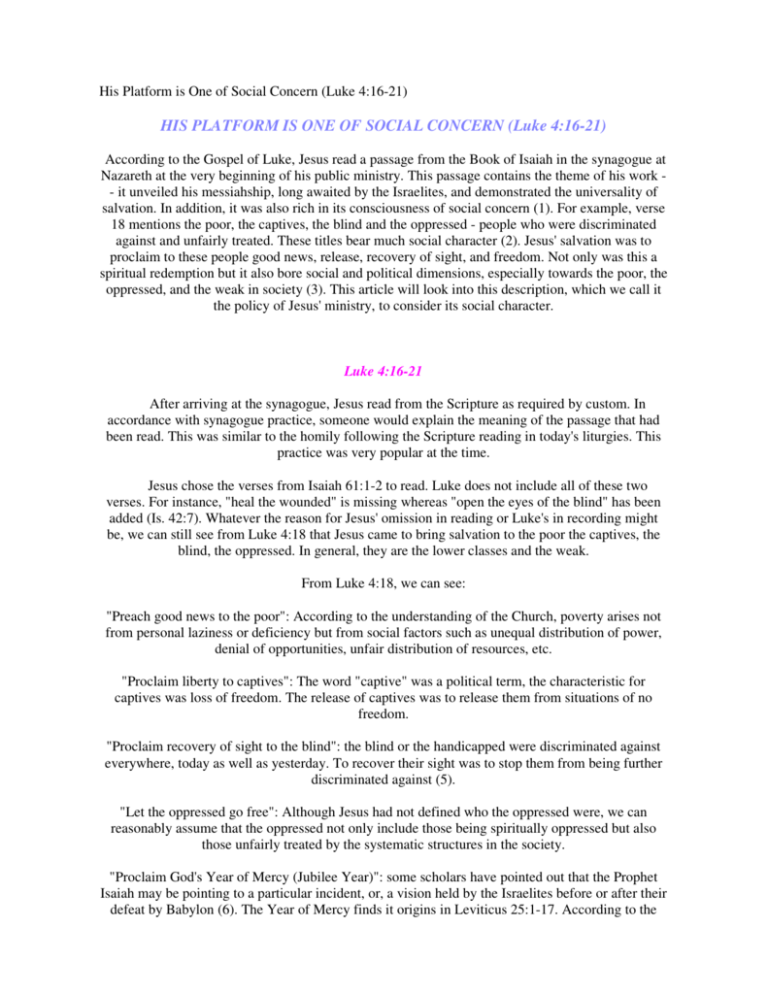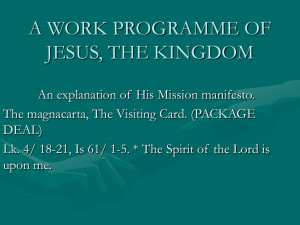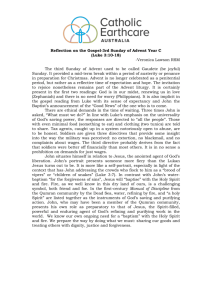HIS PLATFORM IS ONE OF SOCIAL CONCERN (Luke 4:16-21)
advertisement

His Platform is One of Social Concern (Luke 4:16-21) HIS PLATFORM IS ONE OF SOCIAL CONCERN (Luke 4:16-21) According to the Gospel of Luke, Jesus read a passage from the Book of Isaiah in the synagogue at Nazareth at the very beginning of his public ministry. This passage contains the theme of his work - it unveiled his messiahship, long awaited by the Israelites, and demonstrated the universality of salvation. In addition, it was also rich in its consciousness of social concern (1). For example, verse 18 mentions the poor, the captives, the blind and the oppressed - people who were discriminated against and unfairly treated. These titles bear much social character (2). Jesus' salvation was to proclaim to these people good news, release, recovery of sight, and freedom. Not only was this a spiritual redemption but it also bore social and political dimensions, especially towards the poor, the oppressed, and the weak in society (3). This article will look into this description, which we call it the policy of Jesus' ministry, to consider its social character. Luke 4:16-21 After arriving at the synagogue, Jesus read from the Scripture as required by custom. In accordance with synagogue practice, someone would explain the meaning of the passage that had been read. This was similar to the homily following the Scripture reading in today's liturgies. This practice was very popular at the time. Jesus chose the verses from Isaiah 61:1-2 to read. Luke does not include all of these two verses. For instance, "heal the wounded" is missing whereas "open the eyes of the blind" has been added (Is. 42:7). Whatever the reason for Jesus' omission in reading or Luke's in recording might be, we can still see from Luke 4:18 that Jesus came to bring salvation to the poor the captives, the blind, the oppressed. In general, they are the lower classes and the weak. From Luke 4:18, we can see: "Preach good news to the poor": According to the understanding of the Church, poverty arises not from personal laziness or deficiency but from social factors such as unequal distribution of power, denial of opportunities, unfair distribution of resources, etc. "Proclaim liberty to captives": The word "captive" was a political term, the characteristic for captives was loss of freedom. The release of captives was to release them from situations of no freedom. "Proclaim recovery of sight to the blind": the blind or the handicapped were discriminated against everywhere, today as well as yesterday. To recover their sight was to stop them from being further discriminated against (5). "Let the oppressed go free": Although Jesus had not defined who the oppressed were, we can reasonably assume that the oppressed not only include those being spiritually oppressed but also those unfairly treated by the systematic structures in the society. "Proclaim God's Year of Mercy (Jubilee Year)": some scholars have pointed out that the Prophet Isaiah may be pointing to a particular incident, or, a vision held by the Israelites before or after their defeat by Babylon (6). The Year of Mercy finds it origins in Leviticus 25:1-17. According to the Bible, Jews took every seven years as a cycle. In the first six years, sowing, pruning the vineyard and harvesting were allowed. The seventh year was the Sabbath Year when cultivation, pruning of the vineyard or harvesting was forbidden and the land rested completely. The year following seven Sabbath Years, i.e. the fiftieth year, was a Jubilee Year. In addition to forbidding of sowing and harvesting, only wild produce could be eaten, all debts were cancelled, all pawned properties were returned, sold land was given back to the original owner, slaves regained their freedom and returned home, etc. (7). In view of this, the content for the Jubilee Year established some concrete and social characteristics, the aim of which was the re-distribution of resources. Resources of the Earth were for the use of all after recycling. This matches with the spirit of environmental protection. The debtors or the slaves, who had experienced the oppression from unfair systems, could start again from the beginning and get a fairer chance in competition with others. Of course, this does not mean that Jesus demands blind observance of these guidelines, for instance, that we should stop all work upon the arrival of a Jubilee. On the contrary, we have to understand the social and political meaning of the Jubilee Year (8). This involves the re-distribution of resources, the emphasis on fairness, the pursuit of structural change for meeting the demands of social justice. Building heaven on earth for the poor and the oppressed. As mentioned above, poverty is a social phenomenon. In understanding the phrase, "preach the good news to the poor", the poor are not just those spiritually poor. The poor here also refer to those suffering from economical or material deficiency whereas the spiritually poor are, of course, the targets for Jesus' salvation (9). Jesus' policy is not only to build a spiritual Heaven but also to include the appeal for a just human society. Establishing the Reign of God will not be confine to the level of the human heart but include the premise of political or social reality (10). Genuine concern for the poor and the oppressed needs to be consistent in words and deeds. As the Body of Christ, the Church needs to set an example. To really help these people is to oppose or work to eliminate those cultural or social policies which make people poor or oppressed. Otherwise, we participate in the roll of reinforcing these policies and making people suffer further (11). In other words, if the Gospel of the Lord is to bring to all salvation and an end to suffering, it will involve something more than prayer, mass, spreading the Gospel, services, etc. Christians also need to participate in transforming unjust social and cultural policies. In other words, a holistic, integrated faith will include a life of prayer, fraternal interpersonal relationships, taking part in liturgies, serving others... and taking part in transforming unjust social and cultural policies. If theological reflection is not based on the earth and does not look closely at the social and political reality, it is incomprehensive because we overlook the real needs of people (12). In declaring his policies and in his sayings, teachings and behavior, Jesus demonstrated that he was in solidarity with the poor, the sick, the handicapped, the victims of discriminated and granted them salvation. Today, do we, Christians who follow Christ, need to learn from him this spirit of social concern? Perkins, Harvey, “ Four Bible studies on development in the Asian Context” , in South East Asia Journal of Theology, 21 No 1 (1980), p.81. (1) (2) 尤達著﹐廖湧祥譯﹐《耶穌政治》﹐ (3) (香港﹕信生出版社,1990年)﹐頁39。Powell, Mark Allan, What are they saying about Luke?, (New York: Paulist Press, 1989), p.88. (4) Prior, Michael, Jesus the liberator: Nazareth Liberation Theology( Luke 4:16-30), (Sheffield: Sheffield Academic Press, 1995), p.113-114. (5) Perkins, Harvey, “ Four Bible studies on development in the Asian Context” , in South East Asia Journal of Theology, 21 No 1 (1980), p.79~81. (6) 尤達著﹐廖湧祥譯﹐《耶穌政治》﹐ (7) (香港﹕信生出版社,1990年)﹐頁41。Perkins, Harvey, “ Four Bible studies on development in the Asian Context” , in South East Asia Journal of Theology, 21 No 1 (1980), p.83~84. (8) (9) Walker, T. Vaughn, “Luke 4:16~30”, in Review and Expositor, vol 85 No 2 (Spring 1988), p.322. Powell, Mark Allan, What are they saying about Luke?, (New York: Paulist Press, 1989), p.88. (10) (11) Prior, Michael, Jesus the liberator: Nazareth Liberation Theology( Luke 4:16-30), (Sheffield: Sheffield Academic Press, 1995), p.194. Perkins, Harvey, “ Four Bible studies on development in the Asian Context” , in South East Asia Journal of Theology, 21 No 1 (1980), p.86. (12) Ibid.









